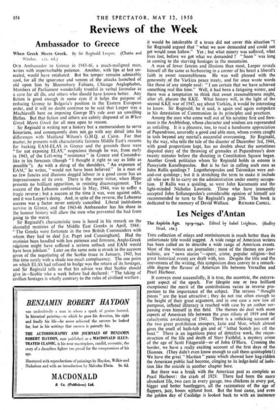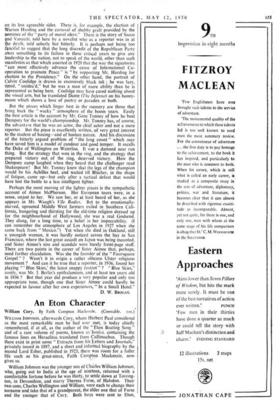Les Neiges d'Antan
THIS collection of essays and reminiscences is much better than its unfortunate title would suggest. A wide range of American writers has been called on to describe a wide range of American events. Most of the writers are journalists ; most of the themes are jour- nalistic, are " news stories "—sport, crime, popular religion—but great historical events are dealt with, too. Despite the title and the unevenness of the writing, this symposium does convey to a remark- able degree the flavour of American life between Versailles and Pearl Harbour.
It conveys most successfully, it is true, the eccentric, the extrava- gant aspect of the epoch. For (despite one or two brilliant exceptions) the merit of the contributions varies in inverse pro- portion to the importance of the subject. The serious " thought pieces " are the least attractive ; they do not rise often enough to the height of their great argument, and in one case a new low of pompous, inflated illiteracy is reached with ease by an author sur- passing even himself in this field. The themes do deal with most aspects of American life between the gran rifiuto of 1919 and the cataclysmic awakening of 1941. There is a rollicking account of the two great prohibition snoopers, Izzie and Moe, which almost gives the smell of bath-tub gin and of " lethal Scotch just- off the boat." There is an ingenious piece of detective work, the recon- struction of the life and death of Starr Faithful, a mystery crime of the age of Scott Fitzgerald—or of John O'Hara. Crossing the border, we have a really exciting account of the first days of the Dionnes. (They didn't even know enough to call them quintuplets!) We have the great " Martian " panic which showed how hag-ridden the American public had become, clinging to its ledge-hold of isola- tion like the suicide in another chapter here. But there was a brealk with the American past as complete as Pearl Harbour: the crash of 1929. There had been the more abundant life, two cars in every garage, two chickens in every pot, bigger and better bootleggers, all the razzmatazz of the age of flappers, jazz, boom wjthout bust. But the bust came, and even the golden day of Coolidge is looked back to with an insistence on its less agreeable sides. There is, for example, the election of Warren Harding and the carnival of shabby graft provided by the nominee of the " party of moral ideas." There is the story of Sacco nd Vanzetti, told here by a novelist who as a reporter was in at e death, told soberly but bitterly. It is perhaps not being too anciful to suggest that the long discredit of the Republican Party owes something to its failure in these critical years to give any leadership to the nation, not to speak of the world, other than such manifestos as that which asserted in 1920 that the way the signatories " can most effectively advance the cause of International Co- operation to promote Peace " is " by supporting Mr. Harding for election to the Presidency." On the other hand, the portrait of Calvin Coolidge is drawn in excessively black ink ; he was lazy, timid, " unidea'd," but he was a man of more ability than he is represented as being here. Coolidge may have cared nothing about the visual arts, but he translated Dante (The Inferno) on his honey- moon which shows a love of poetry or paradox or both.
But the pieces which linger best in the memory are those that bring back the " wacky " atmosphere of the boom years. Easily the best article is the account by Mr. Gene Tunney of how he beat Dempsey for the world's championship. Mr. Tunney has, of course, the advantage that he was an actor, the chief actor and not a mere reporter. But the piece is excellently written, of very great interest to the student of boxing—and of human nature. And his discussion of the bitterly argued problem of " the long count " which may have saved him is a model of candour and good temper. It recalls the Duke of Wellington on Waterloo. It was a damned near run thing. But the strategy that won in the ring, and the strategy that prepared victory outs of the ring, deserved victory. How the Dempsey camp laughed when they heard that the challenger read Shakespeare! But Mr. Tunney knew that the legs of the champion would be his Achilles heel, and waited till Blficher, in the shape of fatigue, came up—but only after a tactical defeat that would have lost the battle to a less intelligent fighter.
Perhaps the most moving of the lighter pieces is the sympathetic account of Aimee McPherson. Her European tours were, in a sense, unjust to her. We saw her, or at least heard of her, as she appears in Mr. Waugh's Vile Bodies. But to the emotionally- starved, uprooted Middle West farmers exiled in Southern Cali- fornia, hungering and thirsting for the old-time religion dressed up for the neighbourhood of Hollywood, she was a real Godsend. They clung, for a long time, to a belief in her impeccability. (I can remember the atmosphere of Los Angeles in 1927 when she came back from " Mexico.") Yet when she died,in Oakland, still a youngish woman, it was hardly noticed across the bay in San Francisco, where the last great assault on Japan was being mounted, and Sister Aimee's sins and scandals were barely front-page stuff. There are two points in the career of Sister Aimee that, perhaps, need further elucidation. Was she the founder of the " Foursquare Gospel " ? Wasn't it in origin a rather ollscure Ulster religious movement ? And can it be true that a reporter, in 1936, found her playing " ' Blue Skies,' the latest snappy foxtrot" ? " Blue Skies," surely, was Mr. I. Berlin's epithalamium, and at least ten years old in 1936 ? But that year did produce a very popular and only too appropriate tune, though one that Sister Aimee could hardly be expected to favour after her own experiences, " In a Small Hotel."
D. W. BROGAN.







































 Previous page
Previous page